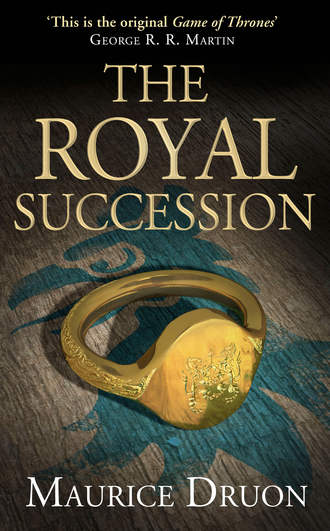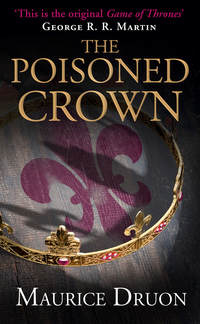
Полная версия
The Royal Succession
Duèze himself received the visit of two of his Provençal colleagues, Cardinal de Mandagout and Bérenger Frédol, the elder. But Duèze pretended to have but just emerged from his theological studies and to know nothing. During this time, in a cell near the Cardinal’s apartment, Guccio Baglioni was sleeping like a log, in no state to speculate what might be the cause of all the panic.
For the last hour Messire Varay, Consul of Lyons,7 and three of his colleagues, who had come to ask for an explanation in the name of the City Council, had been kept waiting in the Count of Poitiers’s antechamber.
The Count was sitting in camera with the members of his entourage and the great officers who were part of his delegation.
At last the hangings parted and the Count of Poitiers appeared, followed by his councillors. They all wore the grave expressions of men who had just reached an important political decision.
‘Ah, Messire Varay, you have come at the right moment, and you too, Messires Consuls,’ said the Count of Poitiers. ‘We can give you at once the message we were about to send you. Messire Mille, will you be so good as to read it?’
Mille de Noyers, a jurist, a Councillor of Parliament and Marshal of the East under Philip the Fair, unrolled the parchment and read as follows:
“To all the Bailiffs, Seneschals, and Councils of loyal towns. We would have you know the great sorrow that has befallen us by the death of our well-beloved brother, the King, our Lord Louis X, whom God has removed from the affection of his subjects. But human nature is such that no one may outlive the term assigned him. Thus we have decided to dry our tears, to pray with you to Christ for his soul, and to show ourselves assiduous for the government of the Kingdom of France and the Kingdom of Navarre that their rights may not perish, and that the subjects of these two kingdoms may live happily beneath the buckler of justice and of peace.
“The Regent of the two Kingdoms, by the Grace of God.
PHILIPPE”
When they had recovered from their astonishment, Messire Varay immediately came forward and kissed the Count of Poitiers’s hand; then the other Consuls unhesitatingly followed suit.
The King was dead. The news was so surprising in itself that no one thought, for several minutes at least, of questioning it. In the absence of an heir who was of age, it seemed perfectly normal that the elder of the sovereign’s brothers should assume power. The Consuls did not for a moment doubt that the decision had been taken in Paris by the Chamber of Peers.
‘Have this message cried in the town,’ Philippe of Poitiers ordered; ‘which done, the gates will be immediately opened.’
Then he added: ‘Messire Varay, you hold a great position in the cloth trade; I should be glad if you would furnish me with twenty black cloaks which may be placed in the antechamber to clothe those who come to condole with me.’
He then dismissed the Consuls.
The two first acts of his seizure of power had been accomplished. He had been proclaimed Regent by his entourage, who became thereby his Council of Government. He would be recognized by the City of Lyons in which he was staying. He was now in a hurry to extend this recognition over the whole kingdom and thus place the accomplished fact before Paris. It was a question of speed.
Already the copyists were reproducing his proclamation in considerable quantities, and the couriers were saddling their horses to ride with it into every province.
As soon as the gates of Lyons were opened, they hastily set out, passing three couriers who had been kept on the other side of the Saône since morning. The first of them carried a letter from the Count of Valois, announcing himself as the Regent appointed by the Council of the Crown, and asking Philippe to agree, so that the appointment might become effective. ‘I am sure that you will wish to help me in my task for the good of the kingdom, and will give me your agreement as soon as possible, like the good and well-beloved nephew you are.’
The second message came from the Duke of Burgundy, who also claimed the regency in the name of his niece, the little Jeanne of Navarre.
Finally, the Count of Evreux informed Philippe of Poitiers that the peers had not sat in accordance with custom and precedent, and that Charles of Valois’s haste to seize the reins of government was supported by no legal document or assembly.
The Count of Poitiers had immediately gone into council again with his entourage. It was composed of men who were hostile to the policies pursued by the Hutin and the Count of Valois during the last eighteen months. In the first place, there was the Constable of France, Gaucher de Châtillon, Commander of the Armies since 1302, who could not forgive the ridiculous campaign of the ‘Muddy Army’ which he had been compelled to conduct in Flanders the preceding summer. Then there was his brother-in-law, Mille de Noyers, who shared his feelings. Then, the jurist Raoul de Presles who, after rendering so many services to the Iron King, had had his goods confiscated, while his friend Enguerrand de Marigny had been hanged and he himself had been put to the question by water though no confession had been extracted from him; as a result, he suffered from permanent stomach-pains and bore the ex-Emperor of Constantinople a considerable grudge. He owed his safety and his return to favour to the Count of Poitiers.
Thus a sort of opposition party, which included the survivors among the great councillors of Philip the Fair, had formed about the Count of Poitiers. No one looked kindly on the ambitions of the Count of Valois or indeed wanted the Duke of Burgundy to meddle in the affairs of the Crown. They admired the speed with which the young Prince had acted and they placed their hopes in him.
Poitiers wrote to Eudes of Burgundy and to Charles of Valois, without mentioning their letters, indeed as if he had not received them, to inform them that he considered himself Regent by natural right, and that he would summon the Assembly of Peers to give him its sanction as soon as possible.
In the meantime he appointed commissaries to go to the principal cities of the kingdom and assume authority in his name. Thus that day saw the departure of several of his knights – who were later to become his ‘Knights Pursuivant’8 – such as Regnault de Lor, Thomas de Marfontaine and Guillaume Courteheuse. He kept with him Anseau de Joinville, the son of the great Joinville, and Henry de Sully.
While the knell tolled from all the steeples, Philippe of Poitiers conferred for a long time with Gaucher de Châtillon. The Constable of France sat by right on every government assembly, the Chamber of Peers, the Grand Council and the Small Council. Philippe, therefore, asked Gaucher to go to Paris to represent him and oppose Charles of Valois’s usurpation until his own arrival; moreover, the Constable would make sure that all the troops in the capital, particularly the Corps of Crossbowmen, were under his control.
For the new Regent, at first to the surprise, but then to the approbation, of his councillors, had determined to remain temporarily in Lyons.
‘We cannot leave the tasks we have in hand,’ he had declared; ‘the most important thing for the kingdom is to have a Pope, and we shall be all the stronger when we have made him.’
He hurried on the signature of the contract of betrothal between his daughter and the Dauphiniet. At first sight this seemed to have no connection with the pontifical election, yet in Philippe’s mind they were linked. The alliance with the Dauphin of Viennois, who ruled over all the territories south of Lyons and controlled the road to Italy, was a move in his game. If the Cardinals took it into their heads to slip through his fingers, they would not be able to take refuge in that direction. Furthermore, the betrothal consolidated his position as Regent; the Dauphin would be in his camp and would have sound reasons for not abandoning him.
Because of mourning the contract was signed during the following days without festivities.
At the same time Philippe of Poitiers negotiated with the most powerful baron of the region, the Count de Forez, who was also a brother-in-law of the Dauphin, and held the right bank of the Rhône.
Jean de Forez had fought in the campaign in Flanders, had several times represented Philip the Fair at the Papal Court, and had done very good work in getting Lyons ceded to the Crown. The Count of Poitiers knew that as soon as he resumed his father’s policy he could count on him.
On the 16th of June the Count de Forez performed a highly spectacular gesture. He paid solemn homage to Philippe as the suzerain of all the suzerains of France, thus recognizing him as the holder of the royal authority.
The following day Count Bermond de la Voulte, whose fief of Pierregourde was in the seneschalship of Lyons, placed his hands between those of the Count of Poitiers and swore him a similar oath of loyalty.
Poitiers asked the Count de Forez to hold ready seven hundred men-at-arms in secret. The Cardinals would not now be able to escape from the town.
Nevertheless, there was still a long way to go before an election was achieved. Negotiations lagged. The Italians, feeling that the Regent was in haste to return to Paris, had hardened in their position. ‘He’ll tire first,’ they said. Little they cared for the tragic state of anarchy in which the affairs of the Church were foundering.
Philippe of Poitiers had several interviews with Cardinal Duèze, who seemed to him much the most intelligent member of the Conclave, at once the most lucid and the most imaginative expert in religious matters, and the most desirable administrator for Christendom in these difficult times.
‘Heresy is flourishing everywhere, Monseigneur,’ said the Cardinal in his cracked, disquieting voice. ‘And how could it be otherwise with the example we give? The Devil takes advantage of our discord to sow his tares. But it is above all in the diocese of Toulouse that they flourish the most vigorously. It is an old land of rebellion and nightmare! The next Pope should divide that too-extensive diocese, so difficult to govern, into five bishoprics, placed in firm hands.’
‘Which would create a number of new benefices,’ replied the Count of Poitiers, ‘from which, of course, the Treasury of France would receive the annates. You see no objection to that?’
‘None.’
The first year’s revenues from new ecclesiastical benefices were called ‘annates’, which the King had a right to collect. The absence of a Pope prevented appointments being made to these benefices, which was a considerable loss to the Treasury, without taking into account the near-impossibility of collecting the arrears of taxes from the Church, while the clergy took advantage of the situation to raise every kind of difficulty which could not be resolved so long as the throne of Saint Peter was vacant. And indeed, when Philippe and Duèze considered the future, one as Regent, the other as eventual Pontiff, finance was the first concern of both.
Owing to the feudal rebellions, the revolt of the Flemings, the insurrection of the nobles of Artois and the brilliant inspirations of Charles of Valois, the royal Treasury was not only empty, but indebted for several years to come.
The papal Treasury, after two years of errant Conclave, was in no better state; and if the Cardinals sold themselves dearly to the princes of this world, it was because many of them no longer had any means of subsistence other than bartering their votes.
‘Fines, Monseigneur, fines,’ Duèze counselled the young Regent. ‘Fine those who have misbehaved, and the richer they are, the more heavily. If someone should break the law who has a hundred livres, take twenty; if he has a thousand, take five hundred; and should he have a hundred thousand, take practically all that he has. You’ll find that this policy has three advantages: in the first place, the yield will be the greater; in the second, deprived of his power, the malefactor will no longer be able to abuse it; and, finally, the poor, of whom there are great numbers, will be on your side and place confidence in your justice.’
Philippe of Poitiers smiled.
‘What you so wisely suggest, Monseigneur, may be most suitable to royal justice which is a secular arm,’ he replied, ‘but in order to restore the finances of the Church, I do not see …’
‘Fines, fines,’ repeated Duèze. ‘Let us place a tax on sin; it will be an inexhaustible source of revenue. Man is sinful by nature, but more disposed to penitence of the heart than of the purse. He will regret his sins the more keenly, and be the more hesitant to relapse into error, if our absolutions are accompanied by a tax. Whoever wishes to reform must pay for the privilege.’
‘Is he joking?’ thought Poitiers, who, as he saw more of Duèze, was discovering the Cardinal in Curia’s liking for paradox and mystification.
‘And what sins do you propose taxing, Monseigneur?’ he asked, as if he were joining in the game.
‘In the first place those committed by the clergy. We must begin by reforming ourselves before we undertake to reform others. Our Holy Mother is too tolerant of shortcomings and abuses. Thus, neither holy orders nor priesthood may be given to men who are mutilated or deformed. And yet, the other day, I saw a certain Abbé Pierre, who is with Cardinal Caetani, with two thumbs on his left hand.’
‘A little hit at our old enemy,’ thought Poitiers.
‘I have made inquiries,’ Duèze went on, ‘and it appears that the halt, the maimed and the eunuchs who conceal their misfortune beneath a habit, and indeed are beneficed by the Church, are legion. Are we to cast them from our bosom rather than efface their fault, reduce them to penury and perhaps throw them into the arms of the heretics of Toulouse or similar religious confraternities? Let us permit them rather to redeem themselves; and to redeem is to pay.’
The old prelate was perfectly serious. His imagination, stimulated by his meeting with the Abbé Pierre, had created, during these last nights, a complete and precise system on which he intended writing a memorandum to be submitted, so he modestly said, to the next Pope.
It was to create a Holy Office of Penitentiary, which would bring in revenue to the Holy See from bulls of absolution of all kinds. Mutilated priests might obtain absolution at the rate of a few livres for a missing finger, twice as much for a lost eye, and the same for the absence of one or both testicles. A priest who had castrated himself would have to pay a higher price. From bodily infirmities Duèze passed to those of the soul. Bastards who had concealed their condition when receiving orders, priests who had taken the tonsure though married, priests who married secretly after ordination while it was still current, priests who lived unmarried with a woman, priests who were bigamists, or incestuous, or sodomites, would all be taxed proportionately to their sin. Nuns who had wantoned with several men, either within or without their convent, would be subject to particularly costly rehabilitation.9
‘If the creation of this Penitentiary’, declared Duèze, ‘does not bring in two hundred thousand livres the first year, I’ll be …’
He was going to say ‘I’ll be burnt’, but stopped in time.
‘At least,’ thought Poitiers, ‘if he’s elected, I shall have no need to be concerned for the papal finances.’
But in spite of all Duèze’s manoeuvres, and in spite of the support Poitiers gave him secretly, the Conclave still marked time.
Moreover, the news from Paris was far from good. Gaucher de Châtillon, making common front with the Count of Evreux and Mahaut of Artois, was doing his best to put a brake on Charles of Valois’s ambitions. But Charles was living in the Palace of the Cité, where he had Queen Clémence at his mercy; he was running affairs as he pleased, and sending out to the provinces instructions contrary to those sent by Poitiers from Lyons. Moreover, the Duke of Burgundy had arrived in Paris, on the 16th of June, to establish his rights; he knew that he had the support of the vassals of his huge duchy. France, therefore, had three regents. This situation could not continue for long, and Gaucher asked Philippe to return to Paris.
On the 27th of June, after a restricted council meeting, attended by the Count de Forez and the Count de la Voulte, the young Prince decided to set out as soon as possible, and ordered his escort’s baggage-train to be assembled. At the same time, learning that no solemn mass had yet been held for the repose of his brother’s soul, he ordered masses to be said on the following day, before his departure, in every parish in the town. All the high and low clergy were expected to attend to join their prayers with the Regent’s.
The Cardinals, particularly the Italians, were delighted. Philippe of Poitiers was being compelled to leave Lyons without having made them give way.
‘He is concealing his flight under the pomp of mourning,’ said Caetani, ‘but let him go all the same, that accursed young man. He thought he held us in the hollow of his hand. I assure you that we shall be back in Rome before the month is out.’
5
The Gates of the Conclave

CARDINALS ARE IMPORTANT PEOPLE who must not be mixed with the small fry of the clergy. The Count of Poitiers had ordered that the church of the monastery of the Predicant Friars, called the Church of the Jacobins,10 the most beautiful, the largest, after the Primatial Saint-Jean, and also the best fortified, should be reserved to them for the service to the memory of Louis X. The Cardinals saw in this selection no more than normal respect for their dignity. None was absent from the ceremony.
They numbered but twenty-four and yet the church was full, for each Cardinal was escorted by his whole household – chaplain, secretary, treasurer, clerks, pages, valets, linkmen and trainbearers: nearly six hundred people in all were assembled between the massive white pillars.
Rarely had a funeral mass been followed with so little peaceful meditation. It was the first time for many months that the Cardinals, who had been living in cliques in separate residences, had found themselves all gathered together. Some had not seen each other for nearly two years. They watched each other, quizzed each other, commented on each other’s actions and appearance.
‘Did you see that?’ someone would whisper. ‘Orsini has greeted the younger Frédol. Stefaneschi has been talking for quite a while to Mandagout. Are they rallying to the Provençaux? But Duèze doesn’t look at all well; he’s grown much older.’
And, indeed, Jacques Duèze was making an effort to control his youthful lightness of foot, and walked in with slow step, replying to greetings vaguely, as if he were already detached from this world.
Guccio Baglioni, dressed as a page, formed part of his suite. He was supposed to speak nothing but Italian and to have come straight from Sienna.
‘Perhaps I should have done better,’ thought Guccio, ‘to have put myself under the Count of Poitiers’s protection, for I should certainly have gone back to Paris with him today and I should have been able to make inquiries about Marie, of whom I have had no news for so long. Instead of which, here I am, entirely dependent on this old fox, to whom I have promised my uncle’s money, but who will do nothing for me till the money has arrived. And my uncle does not reply. They say that Paris is in turmoil. Marie, Marie, my beautiful Marie! She’ll think I’ve abandoned her. Perhaps she even hates me now? What have they done with her?’
He imagined her shut up at Cressay by her brothers, or in some convent for Magdalens. ‘Another week like this, and I shall go back to Paris.’
Duèze turned every now and then to look behind him with a curiously alert expression.
‘Are you afraid of something, Monseigneur?’ Guccio asked.
‘No, no, I fear nothing,’ replied the Cardinal, who began secretly observing his neighbours.
The redoubtable Cardinal Caetani, with his thin face divided by a long aquiline nose, and his hair which seemed to shoot out like white flames from the edge of his red skull-cap, made no attempt to conceal his triumph. The catafalque, symbol of Louis X’s death, corresponded in his mind to the waxen doll, pierced with pins, with which he had cast a spell. The glances he exchanged with his following, the Abbé Pierre, Father Bost and the clerk Andrieu, his secretary, were those of victory. He wanted to say to all those present: ‘This, Messeigneurs, is what happens when you attract the vengeance of the Caetani, who were already powerful at the time of Julius Caesar.’
The two brothers Colonna, each heavy chin divided by a vertical cleft, looked like warriors disguised as prelates.
The Count of Poitiers had not economized on the choir. There were a full hundred of them, their voices sounding above the organ, which had four men pumping at its bellows. A royal, reverberating music echoed among the vaults, saturated the air with vibrations, and enveloped the crowd. The junior clerks could gossip among themselves with impunity, and the pages laugh or mock their masters. It was impossible to hear what was being said three paces away, and still less what was taking place at the doors.
The service came to an end; the organ and the choir fell silent. Both wings of the great door stood open; but no daylight penetrated into the church.
Suddenly, the Cardinals understood; and an angry clamour broke out. A brand-new wall blocked the doorway. During the mass, the Regent had bricked up the exits. All occurred during the ceremony, obscuring the sun. The Cardinals were prisoners.
There was a fine panic; prelates, canons, priests and valets, all mingled together, ran to and fro like rats in a trap. The pages, climbing on each other’s shoulders, hoisted themselves up to the windows, from where they shouted: ‘The church is surrounded by armed men!’
‘What are we going to do, what are we going to do?’ groaned the Cardinals. ‘The Regent has played a trick on us.’
‘That’s why he favoured us with such loud music!’
‘It’s an attack on the Church. What are we going to do?’
‘We’ll excommunicate him,’ cried Caetani.
‘But what if he starves us to death, or has us massacred?’
The two brothers Colonna and the people of their party had already armed themselves with heavy bronze candelabra, benches and processional maces, determined to sell their lives dearly. The Italians and the Gascons were already beginning to hurl reproaches at each other.
‘All this is your fault,’ cried the Italians. ‘If you had only refused to come to Lyons. We knew some dastardly trick would be played on us.’
‘If you had elected one of us, we should not be here now,’ replied the Gascons.
‘It’s your fault, you bad Christians!’
They were almost on the point of coming to blows.
One door alone had not been entirely blocked; barely room for a man to pass through had been left, but the narrow opening was a hedge of pikes held in iron gauntlets. The pikes lifted and the Count de Forez, in armour, followed by Bermond de la Voulte and a few more armed men, entered the church. They were received with a volley of threats and obscene insults.
His hands crossed on the hilt of his sword, the Count de Forez waited till the clamour died down. He was a strong, courageous man, unmoved by threats or entreaties, profoundly shocked by the example the Cardinals had given during the last two years, and prepared to go to any length to obey the Count of Poitiers’s instructions. His rugged, wrinkled face appeared through his open visor.
When the Cardinals and their people had grown hoarse, his voice rang out over their heads, precise and emphatic, reaching to the end of the nave.
‘Messeigneurs, I am here on the orders of the Regent of France to ask you to devote yourselves henceforth solely to electing a Pope, and to inform you that you will not leave here until that Pope is elected. Each Cardinal may keep with him only one chaplain and two pages or clerks of his choice to serve him. Everyone else will leave.’








